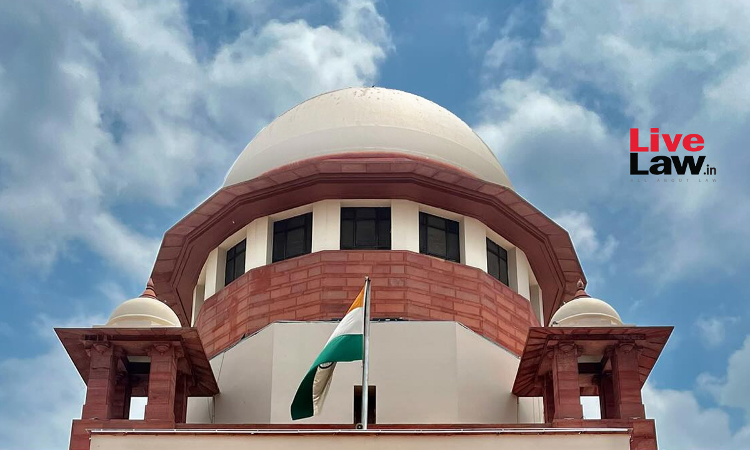- Home
- /
- Supreme court
- /
- 'Mental Health Integral Part Of...
'Mental Health Integral Part Of Right To Life Under Article 21' : Supreme Court Declares While Issuing Guidelines For Students' Welfare
Yash Mittal
26 July 2025 1:17 PM IST
While issuing a set of guidelines for ensuring psychological well-being of students, the Supreme Court ruled that the right to mental health is an integral part of the fundamental right to life and dignity (Article 21). The bench comprising Justices Vikram Nath and Sandeep Mehta held that mental well-being is inseparable from the right to life, while criticizing the coaching centres...
While issuing a set of guidelines for ensuring psychological well-being of students, the Supreme Court ruled that the right to mental health is an integral part of the fundamental right to life and dignity (Article 21).
The bench comprising Justices Vikram Nath and Sandeep Mehta held that mental well-being is inseparable from the right to life, while criticizing the coaching centres and educational institutions for fostering a toxic rank and result culture.
The Court said that an “education is meant to liberate, not burden the learner, and that its true success lies not in grades or rankings but in the holistic growth of a human being capable of living with dignity, confidence, and purpose.”
However, the contemporary academic framework, particularly in the context of competitive examination systems, often subjects students to relentless psychological pressure. The joy of learning has been replaced by anxiety over rankings, results, and relentless performance metrics, the Court noted.
"Students, especially those preparing for competitive examinations, are often caught in a web that rewards conformity over curiosity, output over understanding, and endurance over well-being.
In this paradigm, life becomes a series of tests, and failure is seen not as a part of growth but as a devastating end. In a system driven by performance metrics, competition, and institutional rigidity, students are often subjected to immense psychological strain, particularly in environments geared towards high-stakes competitive examinations," the Court observed.
Mental Health integral component of Right to life
“Mental health is an integral component of the right to life under Article 21 of the Constitution of India. This Court has, in a consistent line of precedents, affirmed that the right to life does not mean mere animal existence, but a life of dignity, autonomy, and well-being. Mental health is central to this vision. In Shatrughan Chauhan v. Union of India and Navtej Singh Johar v. Union of India, this Court recognised mental integrity, psychological autonomy, and freedom from degrading treatment as essential facets of human dignity under Article 21 of the Constitution of India. Further, the Mental Healthcare Act, 2017, a rights based legislation, reinforces this constitutional mandate by recognising every person's right to access mental healthcare and protection from inhuman or degrading treatment in mental health settings. Section 18 of the MH Act guarantees mental health services to all, and Section 115 of the MH Act explicitly decriminalises attempted suicide, acknowledging the need for care and support rather than punishment. These provisions read with judicial precedents reflect a broader constitutional vision that mandates a responsive legal framework to prevent self-harm and promote well-being, particularly among vulnerable populations such as students and youth.”, the court added.
The Court also referenced UN conventions (ICESCR, CRPD) to underline India's obligation to ensure mental health care.
“Under International Law, India's obligations under various human rights instruments and treaties reinforce the above constitutional imperative to protect and promote mental health. The International Covenant on Economic, Social and Cultural Rights, to which India is a State Party, under Article 12 recognises the right to the highest attainable standard of physical and mental health. The United Nations Committee on Economic, Social and Cultural Rights, in its General Comment No. 14, has affirmed that this right includes timely access to mental health services and prevention of mental illness, including suicide. Similarly, under the Convention on the Rights of Persons with Disabilities, 2006, mental health conditions are recognised within the scope of psychosocial disabilities, and States are under an obligation to provide accessible, non discriminatory mental health care to the vulnerable individuals. Further, the World Health Organisation's Mental Health Action Plan, such as the WHA66.8 Comprehensive Mental Health Action Plan 2013- 2020, have identified suicide prevention as a public health priority, calling upon States to reduce suicide mortality rates through national strategies, school based interventions, and community support mechanisms. These evolving international norms reinforce the view that suicide prevention is not merely a policy objective but a binding obligation flowing from the right to life, health, and human dignity.”, the court observed.
Noting the absence of a unified and enforceable legal framework for student suicide prevention in educational institutions and coaching centres despite constitutional and international obligations, the Court issued fifteen binding nationwide guidelines to safeguard student mental health until appropriate legislation is enacted.
Cause Title: SUKDEB SAHA VERSUS THE STATE OF ANDHRA PRADESH & ORS.
Citation : 2025 LiveLaw (SC) 740
Click here to read/download the judgment
Also From Judgment: In NEET Aspirant's Death Case, Supreme Court Issues Guidelines To Protect Mental Health Of Students In Colleges & Coaching Centres



